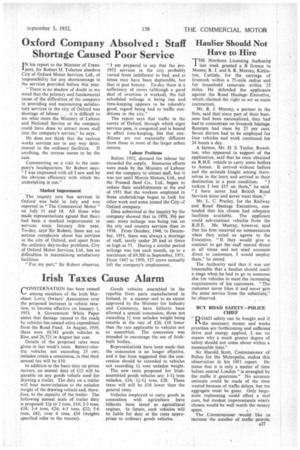Oxford Company Absolved : Staff Haulier Should Not Shortage Caused
Page 29

If you've noticed an error in this article please click here to report it so we can fix it.
Poor Service Have to Hire I N his report to the Minister of Trans
port, Sir Robert H. Tolerton absolves City of Oxford Motor Services, Ltd., of responsibility for any shortcomings in the serviaes provided before this year.
"There is no shadow of doubt in my mind that the primary and fundamental cause of the difficulties of the company in providing and maintaining satisfactory services in the city of Oxford was shortage of labour . . it is difficult to see what more the Ministry of Labour and National Service or the company could have done to attract more staff into the company's service," he says.
He does not think that the various works services are in any way detri mental to the ordinary facilities. If anything, the reverse seems to be the case.
Commenting on a visit to the company's headquarters, Sir Robert says: "I was impressed with all I saw and by the obvious efficiency with which the undertaking is run."
Marked Improvement The inquiry into bus services in Oxford was held in July and was reported in "The Commercial Motor" on July 11 and 18. All those who made representations agreed that there had been a marked improvement in services since January this year. To-day, says Sir Robert, there are no serious complaints about bus services in the city of Oxford, and apart from the ordinary day-to-day problems, City of Oxford Motor Services, Ltd., has no difficulties in maintaining satisfactory facilities.
"For my part," Sir Robert observes, " I am prepared to say that the pre1952 services in the city probably varied from indifferent to bad, and at times may have been deplorable, but that is past history. To-day there is a sufficiency of crews (although a good deal of overtime is worked), the full scheduled mileage is being run and time-keeping appears to be tolerably good, regard being had to traffic conditions in the city."
The report says that traffic in the centre of Oxford, through which eight services pass, is congested and is bound to affect time-keeping. lint that conditions are not materially different from those in most of the larger urban centres.
Labour Problems Before 1952, demand for labour far exceeded the supply. Strenuous efforts were made by the Ministry of Labour and the company to attract staff, but it was not until Morris Motors, Ltd., and the Pressed Steel Co., Ltd., began to reduce their establishments at the end of 1951 that the workers employed in those undertakings began to look for other work and some joined the City of Oxford company.
Data submitted at the inquiry by the company showed that in 1950, 39-1per cent. more mileage was being run on the city and country services than in 1938. From October, 1946, to December, 1951, there was always a shortage of staff, rarely under 20 and at times as high as 55. During a similar period mileage was lost each month, up to a maximum of 69,300 in September, 1951. From 1947 to 1950, 527 crews annually left the company's employment.. HE Northern Licensing Authority last week granted a B licence to Messrs. R. J. and S. R. Murray, Kirlinton, Carlisle, for the carriage of livestock within a 75-mile radius and for household removals within 25 miles. He defended the applicants against the Road Haulage Executive, which claimed the right to act as main contractors.
Mr. R. J. 'Murray, a partner in the firm, said that since part of their business had been nationalized, they had had to concentrate on livestock haulage. Receipts had risen by 25 per cent. Seven drivers had to be employed for four vehicles and work continued for 24 hours a day.
A farmer, Mr. D. S. Taylor, Rowelton, who appeared in support of the application, said that he once obtained an R.H.E. vehicle to carry some heifers to Annan. It arrived without halters and the animals fought among themselves in the lorry and arrived at their destination in a poor condition. "I reckon I lost £15 on them," he said. "I have never had British Road Services since and never want them.'
Mr. L. C. Pratley, for the Railway and Road Haulage Executives, contended that his clients had adequate facilities available. The applicant could sub-contract vehicles from the R.H.E. Mr. Murray, however, said that his firm received no remuneration when they acted as agents to the Executive. "If they would give a contract to get the stuff moved direct at all times and not send accounts direct to customers, I would employ them," he stated.
The Authority said that it was not 'reasonable that a haulier should reach a stage when, he had to go to someone else for vehicles to meet the increasing requirements of his customers. "The customer never likes it and never gets the same service from the substitute," he observed.
BUY ROAD SAFETY—POL10E CHIEF
" ROAD safety can be bought and if the necessary money and works priorities are forthcoming and sufficient drive and energy applied, I see no reason why a much greater degree of safety should not come about within a measurable time."
Sir Harold, Scott, Commissioner of • Police for the Metropolis, makes this observation in his 1951 report. He states that it is only a matter of time before central London "is strangled by the traffic it generates." No accurate estimate could be made of the time wasted because of traffic delays, but the aggregate must be great. Only largescale replanning could effect a real cure, but modest improvements wisely chosen would be well worth the money spent.
The Commissioner would like to increase the number of traffic patrols. A27
















































































